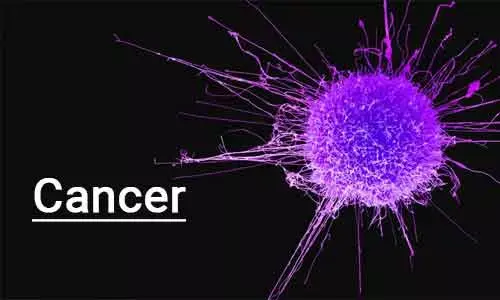- Home
- Medical news & Guidelines
- Anesthesiology
- Cardiology and CTVS
- Critical Care
- Dentistry
- Dermatology
- Diabetes and Endocrinology
- ENT
- Gastroenterology
- Medicine
- Nephrology
- Neurology
- Obstretics-Gynaecology
- Oncology
- Ophthalmology
- Orthopaedics
- Pediatrics-Neonatology
- Psychiatry
- Pulmonology
- Radiology
- Surgery
- Urology
- Laboratory Medicine
- Diet
- Nursing
- Paramedical
- Physiotherapy
- Health news
- Fact Check
- Bone Health Fact Check
- Brain Health Fact Check
- Cancer Related Fact Check
- Child Care Fact Check
- Dental and oral health fact check
- Diabetes and metabolic health fact check
- Diet and Nutrition Fact Check
- Eye and ENT Care Fact Check
- Fitness fact check
- Gut health fact check
- Heart health fact check
- Kidney health fact check
- Medical education fact check
- Men's health fact check
- Respiratory fact check
- Skin and hair care fact check
- Vaccine and Immunization fact check
- Women's health fact check
- AYUSH
- State News
- Andaman and Nicobar Islands
- Andhra Pradesh
- Arunachal Pradesh
- Assam
- Bihar
- Chandigarh
- Chattisgarh
- Dadra and Nagar Haveli
- Daman and Diu
- Delhi
- Goa
- Gujarat
- Haryana
- Himachal Pradesh
- Jammu & Kashmir
- Jharkhand
- Karnataka
- Kerala
- Ladakh
- Lakshadweep
- Madhya Pradesh
- Maharashtra
- Manipur
- Meghalaya
- Mizoram
- Nagaland
- Odisha
- Puducherry
- Punjab
- Rajasthan
- Sikkim
- Tamil Nadu
- Telangana
- Tripura
- Uttar Pradesh
- Uttrakhand
- West Bengal
- Medical Education
- Industry
Dexrazoxane prevents cardiac side effects of chemotherapy for AML in kids

Philadelphia--The cardioprotective drug dexrazoxane preserved cardiac function in pediatric patients undergoing chemotherapy for acute myeloid leukemia (AML) without compromising overall patient survival and potentially improving it, according to a new study by researchers at Children's Hospital of Philadelphia (CHOP). The results suggest dexrazoxane should be considered for cardioprotection in all pediatric patients undergoing standard chemotherapy for AML.
The findings were published today in the Journal of Clinical Oncology.
"This study provides important evidence that using dexrazoxane helps prevent heart damage in children undergoing treatment for AML," said Richard Aplenc, Professor of Pediatrics in the Department of Pediatrics, core faculty member of the Center for Pediatric Clinical Effectiveness at CHOP, and senior author of the study. "These results have arguably changed the standard of care for pediatric AML treatment."
Anthracyclines, a class of drugs used in chemotherapy for cancers such as AML, improve survival in pediatric patients with AML, but the drugs also have cardiac side effects. The drugs generate iron-mediated free radicals and inhibit DNA replication, both of which trigger cell death and left ventricular systolic dysfunction (LVSD) and can lead to heart failure. At least 12% of AML patients experience LVSD within one year of beginning treatment and many also have lower overall rates of survival and increased mortality as a result.
Dexrazoxane is a cardioprotective drug that interferes with iron-mediated free radical formation and cell death caused by anthracyclines. Yet despite consistent evidence of dexrazoxane's cardioprotective benefits, it is used in less than 5% of pediatric AML patients in the United States.
To assess the effectiveness of dexrazoxane in pediatric AML treatment, the researchers collected information on dexrazoxane administration in the most recent clinical trial for AML by the Children's Oncology Group. Whether or not dexrazoxane was used was up to the individual treating physician. Of the 1,092 pediatric AML patients in the trial, 918 were never exposed to dexrazoxane (84%), 96 (9%) received dexrazoxane at each anthracycline administration, and 78 (7%) received dexrazoxane at some but not all of their treatments. Given the scope of their study, the researchers focused only on those patients who received dexrazoxane consistently or not at all.
Patients who received dexrazoxane had significantly lower risk for LVSD than patients who did not (26.5% vs. 42.2%). Patients in both groups had similar 5-year event free survival and overall survival rates, and the results suggest a lower treatment-related mortality among patients who received dexrazoxane (5.7% vs. 12.7%).
Based on these results, the upcoming COG Phase III AML trial will require dexrazoxane use for all patients receiving standard chemotherapy.
"To our knowledge, these data are the first demonstration of a potential survival benefit with dexrazoxane, specifically a reduction in treatment-related mortality," said Kelly D. Getz, PhD, MPH, Assistant Professor of Epidemiology in the University of Pennsylvania Perelman School of Medicine's Department of Biostatistics, Epidemiology, and Informatics and first author of the study. "This suggests that dexrazoxane may directly prevent acute, severe cardiac events that contribute to early deaths. Additional research to understand the underlying biology of anthracycline-associated cardiotoxicity and effective interventions will improve both the cardiovascular and oncologic outcomes for children with cancer."
For more details click on the link: http://dx.doi.org/10.1200/JCO.19.02856
Hina Zahid Joined Medical Dialogue in 2017 with a passion to work as a Reporter. She coordinates with various national and international journals and association and covers all the stories related to Medical guidelines, Medical Journals, rare medical surgeries as well as all the updates in the medical field. Email: editorial@medicaldialogues.in. Contact no. 011-43720751
Dr Kamal Kant Kohli-MBBS, DTCD- a chest specialist with more than 30 years of practice and a flair for writing clinical articles, Dr Kamal Kant Kohli joined Medical Dialogues as a Chief Editor of Medical News. Besides writing articles, as an editor, he proofreads and verifies all the medical content published on Medical Dialogues including those coming from journals, studies,medical conferences,guidelines etc. Email: drkohli@medicaldialogues.in. Contact no. 011-43720751


